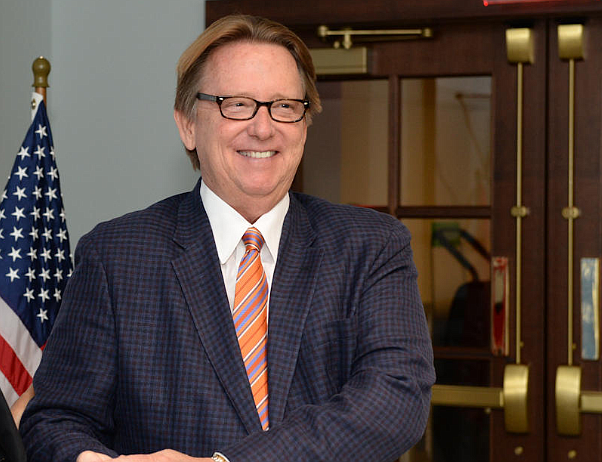
Retiring University of North Florida President John Delaney, a former two-term mayor, said this week he’s not done with public service.
Delaney, who announced in February he would step down as UNF president by May 30, 2018, said “all options are on the table” when it comes to his next career move.
“I don’t want to speculate, but I can tell you that I’m not ready to retire,” Delaney, 61, told the Meninak Club of Jacksonville on Monday.
Delaney, a Republican, has served as UNF president since 2003 after completing a two-term limit as mayor.
He also spoke during an interview after the meeting.
“I’ve joked with a few people that maybe I’ll run for mayor of Neptune Beach or something like that,” said Delaney, who resides in the coastal community.
Neptune Beach Mayor Elaine Brown was elected to a four-year term in 2016.
Delaney also said he is thinking about making a run for state office, citing a lack of “real leadership and lawmakers in positions of power.”
“We have Paul Renner in the House now, and that’s great, but I’m looking at possibly the Senate,” he said.
In June, Renner, from Palm Coast, was elected class leader by his Republican peers, a designation that will likely lead him to become House Speaker beginning in 2022.
Northeast Florida’s incumbent state senators, Republican Aaron Bean and Democrat Audrey Gibson, are seeking re-election in 2018.
Both present challenges for Delaney since they’re considered front-runners in their re-election bids.
Delaney also said some law firms, lobbying firms and businesses are talking to him.
Delaney’s career in public service began in 1981 in the State Attorney’s Office, where he eventually was named chief assistant state attorney by then-State Attorney Ed Austin.
When Austin was elected mayor of Jacksonville in 1991, Delaney was named the city’s general counsel and later served as chief of staff.
In 1995, Delaney was elected as the fifth mayor of the consolidated Jacksonville government, serving two terms through 2003.
Delaney’s time as mayor is probably best known for launching the Better Jacksonville Plan, a $2.25 billion infrastructure improvement program approved by voters in a 2001 referendum. It’s supported by a half-cent sales tax through 2030.
In 2008, Delaney was named interim chancellor of the State University System of Florida, serving through the 2009 legislative session.
He said he is not involved in finding his eventual replacement as UNF president.
This week two City Council committees OK’d appropriating $1.5 million to begin the process of removing ramps connected to the Hart Bridge Downtown.
If approved, the money would pay for surveying, geotechnical investigations and the preparation of a design criteria package.
The project could eliminate the expressway ramps, grading them down to Gator Bowl Boulevard from the Hart Bridge to A. Philip Randolph Boulevard.
The removal and readjustment of the travel lanes could take 30 to 36 months at an estimated cost of $50 million, according to Chief Administrative Officer Sam Mousa.
Mousa presented the administration’s case at the council Finance and the Transportation, Energy and Utility committees this week.
Both panels approved the bill, which heads for a full council vote Tuesday.
Mousa said the city is applying for a $25 million federal infrastructure grant because the project is intended to improve freight traffic to the port from Talleyrand Avenue.
Altering the ramps would create “free-flowing truck traffic,” according to Mousa, with the creation of a T intersection at Gator Bowl Boulevard. That intersection would send trucks directly to Talleyrand Avenue.
If the federal government approves the grant, the remaining costs would be split by the state and the city at $12.5 million each.
A $255,000 traffic study by Florida Department of Transportation supports the removal.
An executive summary of the study suggests the current pattern doesn’t handle peak traffic well during the morning and evening rush hours, particularly freight traffic headed toward Talleyrand Avenue.
“This overcapacity condition causes congestion, safety problems and very slow travel times that will continue to degrade,” the summary reads.
While lowering the ramps would “only add a few seconds” to the typical weekday trip, the study notes “there are no significant changes to intersection level of service.”
Mousa told council members he believes Jacksonville has a good chance at federal and state funding since the project is considered “shovel-ready.”
“The governor likes shovel-ready projects,” he said.
Mousa said Jacksonville’s application for the grant was one of three FDOT forwarded to the federal government. The other projects are not connected to a specific city.
“It will be up to the U.S. Department of Transportation to decide when they will award the grant,” he told Finance Committee members Tuesday.
The rationale to remove the ramps is different from what Curry suggested in November to the Duval Delegation.
Curry said then the structure was an “aging relic” and that its former use as a bypass to a previously busy Shipyards property was causing more harm than good for traffic conditions.
The delegation did not seek the funding at the state level in 2017.
A proposed development plan from Jacksonville Jaguars owner Shad Khan’s Iguana Investments of Florida for the Shipyards and Metropolitan Park properties shows the ramp removed.
The Downtown Investment Authority gave Iguana development rights in April. Iguana is negotiating with the city to develop the 70-acre Downtown riverfront property.
At the Finance Committee, council member Danny Becton raised concerns about the need for removal, asking Mousa if the administration had a “Plan B.”
Mousa told Becton that the mayor’s office would “work with the governor and the FDOT in the event of the grant not being granted.”
“Those discussions have not taken place,” he said.